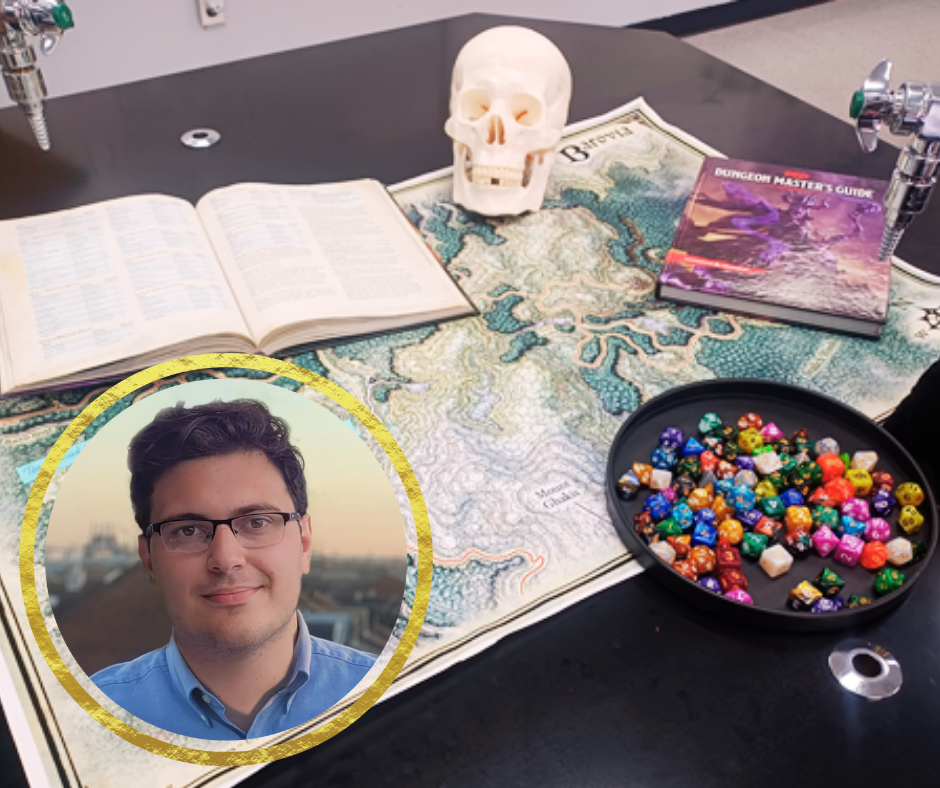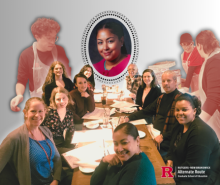A New Jersey Teacher Steps Up to Lead His School’s Dungeons and Dragons Club

Dennis Liflyandchick noticed a student was off task in his tenth-grade biology class. Upon closer look, the student was preoccupied with Dungeons and Dragons (D&D), a fantasy role-playing game. Created in 1974, the tabletop game grew popular in the 1980s and has continued its growth.
Seeing an opportunity for connection, Liflyandchick struck up a conversation about the game.
“He was initially quite shocked I knew what D&D was.”
Liflyandchick not only knows about D&D, but he also understands how to play the game, which encouraged students to engage in casual D&D conversations with their teacher.
Those conversations eventually led to a plea.
The Mastery High School students shared with Liflyandchick that the teacher who led the school’s D&D club resigned, leaving the club’s students without a chaperone. Knowing their teacher was familiar with the game, they asked Liflyandchick to step in.
Now, students have their club back.
“I don’t ever want that space to feel like it’s not there for them,” Liflyandchick said.
Exploring a sense of self through fantasy
Liflyandchick considers himself a casual player. He got involved in D&D toward the end of high school and picked up that involvement more heavily during quarantine in 2020.
“It provided a wonderful opportunity to socialize, as well as provide some needed escapism at the time.”
D&D’s draw is its flexibility, a trait Liflyandchick particularly enjoys. The game can be played anywhere, as you don’t need many supplies for a successful D&D session. Active minds are more than enough, as Liflyandchick has learned from being the club’s sponsor.
“Oftentimes, there are some pretty wacky stories.”
There are a few guidelines to follow, then each player’s imagination takes hold, with players creating and acting out scenes, engaging in a completely different playing experience every time.
“When compared to other activities, it offers a lot of freedom,” Liflyandchick said. “In D&D, a big component is that it’s not algorithmic, just powered by your own imagination. You can do almost anything.”
Players begin by choosing a character that they embody throughout the entire game. From there, a loose storyline is followed, with players exploring various settings and encountering challenges. Scenes are acted out as the characters, using personality traits and backstories to dictate how a player behaves as their character.
“Ultimately, it’s collaborative storytelling, and that has a long history of bonding and socializing,” Liflyandchick. “How long have we been gathering around the campfire and telling stories?”
Liflyandchick views the game’s imaginative role-playing aspect as a useful way for the students to practice self-discovery.
“It’s a safe space to explore certain aspects of themselves and exaggerate that,” he said.
How after-school programming supports students
Nearly eight million students take part in after-school programming in U.S. schools, with elementary students representing 60% of that group. With more than 850,000 elementary-aged children left unattended after school, these programs are a service to students.
After-school clubs don’t just give students a place to go when the bell rings. They also positively impact their social-emotional health and overall academic performance. By regularly participating in extracurricular activities, students are less likely to drop out, and the achievement gap—an academic disparity between two student groups— is shortened.
Having a place to connect with others with shared interests helps build a sense of belonging, one that doesn’t necessarily happen within the classroom. Connecting on a shared interest allows students to bond, put differences aside and meet a friend they wouldn’t get to know by just going to class.
After-school clubs are also helpful to working parents, as they provide a safe and structured option for students to spend their time, as opposed to staying home alone. Additionally, having a teacher serve as the club sponsor gives students an adult they can trust and turn to when they encounter challenges.
At Mastery High School, for example, the D&D club has “a very consistent” 10 members, according to Liflyandchick. The intimate group is passionate about the game and is considering meeting twice a week instead of once.
“I’m reminded how important it is to have a very diverse offering of activities for students to try, and to have a place to go after school,” Liflyandchick said.
If you’re considering following your dream of teaching, Rutgers Alternate Route can offer you the support and training you need to succeed. Be sure to follow Rutgers Alternate Route on Twitter and sign up for Alternate Route’s monthly newsletter for more information and stories from the field of education.

 Heather Ngoma has over 25 years of experience collaborating with educators across New Jersey to drive education innovation. She currently serves as the Director of the Rutgers-GSE Alternate Route Program in the Department of Learning and Teaching, a program which helps career changers, recent college graduates, and other aspiring education professionals become licensed teachers in New Jersey. Follow her on Twitter @heatherngoma.
Heather Ngoma has over 25 years of experience collaborating with educators across New Jersey to drive education innovation. She currently serves as the Director of the Rutgers-GSE Alternate Route Program in the Department of Learning and Teaching, a program which helps career changers, recent college graduates, and other aspiring education professionals become licensed teachers in New Jersey. Follow her on Twitter @heatherngoma.





